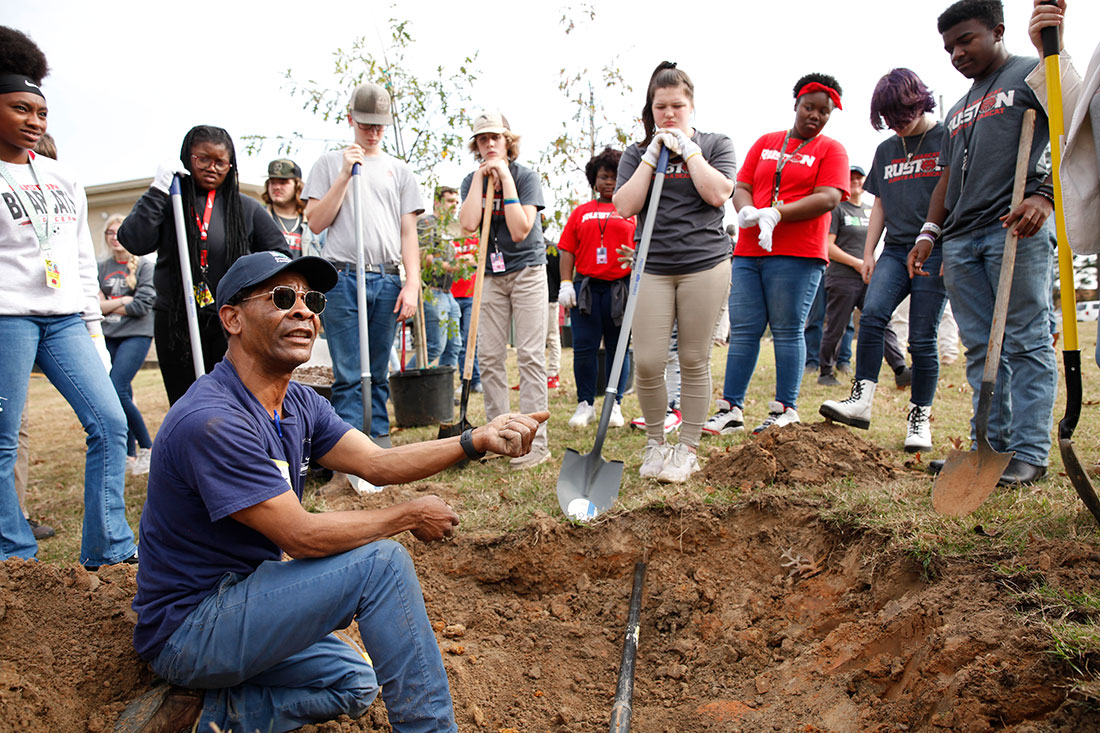
Photo Credit: Kevin Alexander / American Forests
ON A WINTER DAY in 2022 in Ruston, La., Dr. Darrell Street crouched down in a large hole in the ground and looked up at the circle of high school students around him. They leaned on their shovels as he asked what they thought they should do next in the process of planting a large sapling. Should they just plop it in the hole, or did they need to do something else first?
The students eagerly offered that they should measure the hole and then backfill with dirt to make it the right size before planting. It was a process they had learned as part of a new greening event focused on Tree Equity and tree-related careers organized by American Forests with the support of Weyerhaeuser, a sustainable forestry and wood products manufacturing company with operations across the United States and Canada. The hands-on planting event at Ruston High School was the finale of a multiweek curriculum that guides high school students through an inquiry-based learning process about green jobs that protect and enhance our environment.
Weyerhaeuser approached American Forests with the idea after being impressed by the organization’s Tree Equity Score platform, which assesses tree cover in areas of the U.S. with at least 500,000 residents. As a company active in many smaller urban clusters and rural areas, Weyerhaeuser was interested in promoting Tree Equity in less populated places. The company also wanted to provide educational opportunities for rural youth to learn about careers in forestry and other aspects of the green economy.
The idea grew out of Weyerhaeuser’s 3 by 30 Sustainability Ambitions, launched in 2020, which intensify the company’s focus around three key areas: contributing to climate solutions, helping provide sustainable homes and supporting rural communities. The result of this collaboration — a modular curriculum titled Tree Equity Curriculum: Exploring Green STEAM Careers — educates students about green jobs, guides them through collecting and analyzing Tree Equity Score data for their area, and has them participate in a hands-on greening project.
The curriculum includes five lessons and takes four to six weeks to teach in entirety. In the first lesson, students identify their interests, strengths and skills, and think through which kind of job they might want to pursue. In the second activity, they determine their Holland’s Occupational Personality Type by taking the “Find Your Green Jobs” quiz from Project Learning Tree.
The third section covers ecosystem services and jobs that protect and enhance them. The fourth investigates the Tree Equity Score, including an exercise in which students work in groups to figure out which local Census block groups have a score lower than 80 — indicating a priority for more tree cover. This exercise culminates with the greening event. The fifth lesson has students reflect on what they learned and whether they might pursue a green career.
The curriculum has been free online since going live in October 2022. American Forests and Weyerhaeuser chose three locations in which to officially pilot it: Ruston, La., and Tacoma, Wash., which implemented it for 200-250 students each in fall 2022 and spring 2023; and Natchitoches, La., which will do so this fall.
Weyerhaeuser has long-standing operations and is active in all three communities. In Ruston and Tacoma, Weyerhaeuser employee volunteers came to classrooms to talk about their careers and also joined students at the tree-planting events.
“On planting day they’re able to talk through why they’re planting these trees and why the Weyerhaeuser employees are passionate about it,” says Eboni Hall, American Forests’ director of career exploration and development. “It’s about being able to expose them to the green job opportunities in the field. A lot of students don’t have that real-world, hands-on experience.”
The curriculum is receiving positive feedback from participants and is attracting enthusiastic attention. Other partners have expressed interest in expanding the program, and American Forests has plans to implement the curriculum in Phoenix, Detroit, again in Tacoma and in other locations next year.